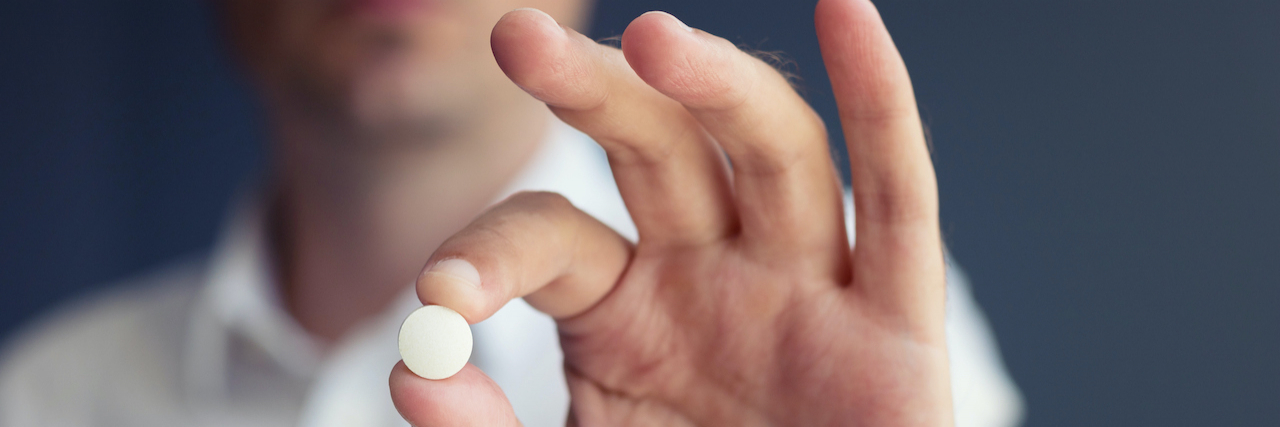My Wish for a Single Tablet Treatment for Bipolar Disorder
Editor's Note
Please see a doctor before starting or stopping a medication.
Illustrious alt-rocker St. Vincent said it best:
Pills to wake, pills to sleep
Pills, pills, pills every day of the week
Pills to walk, pills to think
Pills, pills, pills for the family
• What is Bipolar disorder?
Pills have absolutely saturated American life for decades now. But in recent years, it seems like medications have been even more ubiquitous in our society. Just watch the news and almost every other commercial is for some drug or another. I take eight different medicines for my bipolar disorder.
• What is Bipolar disorder?
While out of town for the season, I am forced to obtain my meds via mail order. Managing this many meds and scheduling refills is a colossal task. I thought everything was on auto-renewal, but it wasn’t. I had to pay out of pocket for several of my meds to get an emergency supply while I waited for Express Scripts to come through in the mail.
I was recently skimming a book titled “Anatomy of an Epidemic — Magic Bullets, Psychiatric Drugs and the Astonishing Rise of Mental Illness In America” by Robert Whitaker and the idea of one pill a day came to mind. The book is a scathing indictment of the pharmaceutical industry and the mental health industrial complex. One of his arguments is that we are completely overmedicated and over-diagnosed.
I believe my diagnosis is correct, and I go to therapy once a month, which is very helpful. But keeping track of eight medicines can be — well — a tough pill to swallow.
I take antidepressants, I take mood stabilizers, I take antipsychotics, I take anti-anxiety pills. An alphabet soup of pharmaceuticals that treat my bipolar disorder.
My depression emerged in December of 2007, while I was living in New York City. Seeing a psychiatrist for the first time in my life brought a diagnosis of depression. My doc placed me on a single SSRI. Of course being bipolar on an antidepressant alone just skyrocketed me into mania.
After a manic episode, I crashed hardcore and took a medical leave from work. I suffered a horrifying episode of major depression that lasted nearly a year.
My psychiatrist tried a jambalaya of newfangled pills — and not Lithium — in order to lift me out of depression. In my current home in Chicago, my doctor and I settled on my medication regimen more than a decade ago. We change doses every now and then, but for the most part, my treatment is static.
But ultimately these pills are something I need. With my first psychiatrist, we tried an exceedingly gargantuan hit-or-miss variety of prescription meds. In fact, I experimented with a cornucopia of antidepressants, save for a few new ones that have popped up in recent years.
It wasn’t until I got a second opinion and tried Lithium that I was lifted out of my deep depression. Lithium saved my life. It’s the most important aspect of my treatment.
While overlooked a lot, Lithium is not a panacea. This is what has worked for me, but everyone’s brain is different and reacts differently to medications.
As most of us know, the pharmaceutical companies are in it to make money. Maybe that’s why my previous psychiatrist — quite possibly in bed with Big Pharma and always having samples of new meds on hand from drug reps — prescribed so many newfangled meds. Because they’re fresh and shiny and they cost money.
Lithium is an old warhorse. It’s cheap and it’s been around since 1970, when it became the first drug approved by the FDA to treat bipolar disorder, then called manic-depression. It is a salt that appears in nature, not a drug engineered, packaged, marketed and sold to us like all other meds. The secret is… Lithium works. But it is tried almost as a last resort for bipolar disorder. And it is used in tandem with other psychiatric meds.
A whopping 11 percent of American adults are taking antidepressants. That’s more than one in 10. This is according to a 2011 study by the Center for Disease Control.
If I had my choice, I would take one pill a day for my bipolar disorder. I don’t understand why this isn’t in development stages. I asked my own doctor, who is up on the latest studies and literature, and he said he has heard nothing of the sort.
For people living with HIV, there is a single tablet treatment available now. Why is there no single magic bullet for bipolar, which has been treated with meds for more than 50 years? Until that day comes, I will continue to swallow my myriad jagged little pills (shoutout to Alanis) just like the amazing St. Vincent delineates:
Pills to grow, pills to shrink
Pills, pills, pills and a good stiff drink
Pills to fuck, pills to eat
Pills, pills, pills down the kitchen sink
Getty image by Vera Kevresan / EyeEm

